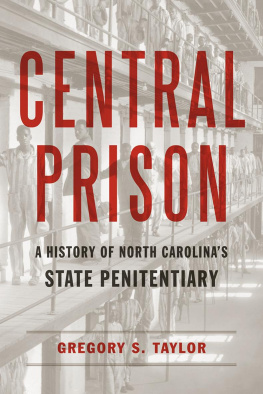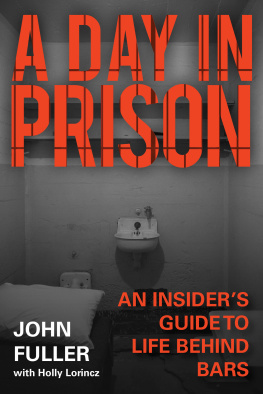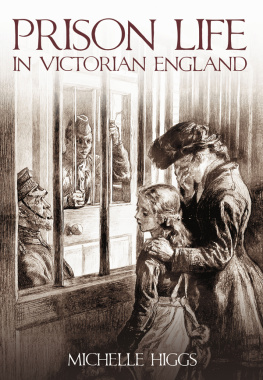For
Elizabeth,
James, Hannah and Jemma,
and
the Governors
who are able to make our prisons
a better place in which to live and work
Prison Governors
Managing prisons in a time of change
Shane Bryans
First published by Willan Publishing 2007
This edition published by Routledge 2011
2 Park Square, Milton Park, Abingdon, Oxon OX14 4RN
711 Third Avenue, New York, NY 10017 (8th Floor)
Routledge is an imprint of the Taylor & Francis Group, an informa business
Shane Bryans 2007
The right of Shane Bryans to be identified as the author of this book has been asserted by him in accordance with the Copyright, Designs and Patents Act of 1988.
All rights reserved; no part of this publication may be reproduced, stored in a retrieval system, or transmitted in any form or by any means, electronic, mechanical, photocopying, recording or otherwise without the prior written permission of the Publishers or a licence permitting copying in the UK issued by the Copyright Licensing Agency Ltd, 90 Tottenham Court Road, London W1P 9HE.
Hardback
ISBN: 978-1-84392-223-0
British Library Cataloguing-in-Publication Data
A catalogue record for this book is available from the British Library
Project managed by Deer Park Productions, Tavistock, Devon
Typeset by TW Typesetting, Plymouth, Devon
Acknowledgements
In addition to the 42 prison Governors who were kind enough to take time out of their busy schedules to give me the opportunity to interview them, I have a number of debts to acknowledge. To the many Governors who inspired my work over the years, and who taught me so much, I shall always owe a huge debt of gratitude. My academic supervisors, Professors Robert Reiner and David Downes, provided the sound advice and wise counsel that practitioner-researchers find invaluable. The Prison Service provided funding for part of the study, until budget cuts required the money elsewhere. The staff of the Prison Service library, and particularly the head librarian Catherine Fell, treated my hundreds of requests with good humour and worked enthusiastically to track down old texts. The European Commission and Council of Europe kindly funded study visits to look at prison management in France, Spain, Ireland and The Netherlands.
My wife Elizabeth remains as understanding as ever, and continues to provide support and encouragement. My children, James, Hannah and Jemma, kept me going by asking, on a daily basis, why I hadn't finished writing yet. My academic soul mate, Roma Walker, helped me to find clarity in the bleaker moments of thinking and writing. Dhao Wother-spoon continues to question my use of English and provided many helpful comments on the manuscript. My mother, Jean Ann Bird, deserves the credit for first getting me interested in prisons. She took me to see Dartmoor prison on one windswept and foggy afternoon, when I was a young boy, and said that if I didn't behave myself that was where I would end up. She was right; some 20 years later I was appointed as assistant governor of Dartmoor prison.
The opinions expressed in this book are those of the author, and the personal views expressed by the prison governors who were interviewed. They do not necessarily reflect the views of the Home Office or government policy.
Preface
Although other professional groups within the criminal justice system have drawn research interest, and studies of penal institutions and their prisoners have an established research record, little attention has been paid to the work of prison Governors. Since joining Her Majesty's Prison Service in 1985, as an assistant governor trainee, I have been trying to work out how Governors are able to keep our prisons functioning despite what appear to be overwhelming obstacles.
This book is an attempt to answer that question. It is an empirical study that examines the changing role and work of prison Governors, charting their historical evolution from medieval gaolers to the emergence of modern Governors in the second half of the twentieth century. It describes how the role has changed over a 500-year period by categorising the office-bearers into five historical types. The development of the modern governor is traced over its 40-year history and four ideal-typical models are constructed to characterise the Governors currently in post. Key areas of transformation in the role are identified as well as aspects that have remained relatively constant.
The focus of the book is on contemporary developments, exploring the nature of the work that Governors do, the changing contexts in which they operate and the ways in which serving Governors define their role and purpose. The book provides an analysis of how the process of change has been accomplished. It examines the role of the prison Governor in relation to significant changes within prisons and the criminal justice system, as well as broader shifts in political culture and public policy.
The book also contributes to the literature on public sector administration and management, examining in particular whether the managerial role of the Governor is sui generis. The book provides a detailed analysis of the role played by prison Governors as managers of complex organisations. It questions, in particular, whether there is anything unique about the managerial tasks facing prison Governors in comparison to other public sector managers.
The primary fieldwork for the book involved 42 interviews with serving Governors and 10 interviews with stakeholders (comprising area managers, headquarters staff and directors of private prisons). A national survey of Governors' job descriptions was also undertaken and a literature review encompassing historical and contemporary materials on prison administration and governance. This book sets out the views of these 42 Governors on how they seek to achieve secure, safe and productive prisons.
The interviews with Governors took place in the late 1990s. The Prison Service has moved on since then and some new structures and organisational changes have taken place. While some of the Governors interviewed have retired, been promoted or moved to other governing posts, what they have to say about their work remains valid today. In the text care has been taken to prevent quotes being individually identifiable. However, I am sure that my former colleagues in the Prison Service will be eager to play spot the Governor.
Shane Bryans
Ankara, Turkey
January 2007
Chapter 1
Introduction Governors and the prison system
Why study Governors a neglected breed?
The prison is an instrument of punishment, which constitutes the darkest region in the apparatus of justice (Foucault 1979: 256). Despite calls for decarceration, tougher community penalties and greater social inclusion, the prison continues to occupy a central position in our criminal justice system as these commentators point out: the prison as an instrument of punishment has escalated further in importance, and solidified its position (Mathieson 2000: 173); So successful has the prison been that, after a century and a half of failures, the prison still exists, producing the same results, and there is the greatest reluctance to dispense with it (Foucault 1979: 277).
While prisons are likely to be a key, and probably the dominant, feature of our penal landscape for the foreseeable future, surprisingly little is known about the people who govern them and what they do on our behalf.







